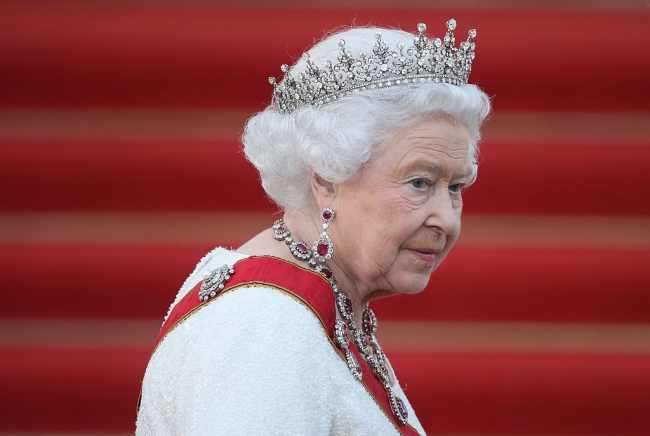You have /5 articles left.
Sign up for a free account or log in.

Queen Elizabeth II in 2015.
Sean Gallup/Getty Images Entertainment/Getty Images Europe
Fact: Queen Elizabeth II passed away last Thursday. It was a sudden but not unexpected event, the culmination of 70 years of her being the head of state for the United Kingdom.
Fact: The United Kingdom, via colonization, inflicted countless amounts of pain and suffering on brown people, Indigenous people, Asian people and most certainly Black people during the queen’s reign.
The queen’s passing and the transition of the monarchy brought many together to mourn the death of a historical figure, yet some felt that her legacy was not worth celebrating. Like most people, Queen Elizabeth’s life was filled with complication. Thus, contemplation on her life and death might be expected to invoke complicated reactions.
Many news outlets and world leaders prepared protocols and executed intricate plans for responding to the queen’s death. They paid tribute and highlighted the queen’s qualities of compassion, discretion, service and respect. Others were quickly reminded of the violent traumas that the monarchy had caused, given its legacy of colonialism and dehumanization.
Enter racism. It is not surprising that responses to the death of the queen from higher education institutions in the United States follow frames that are anti-Black and dismissive of the degrading histories of British control. Now, more than two years after the murders of George Floyd, Breonna Taylor and others in 2020, higher education continues to struggle with issues of race, power and its own historical legacies.
One university, Carnegie Mellon University, which bears the name of not one but two of the richest men America has ever seen, gave an immediate response after the death of the queen via Twitter. However, Carnegie Mellon’s response was not a prepared statement about her death; instead, the institution attempted to distance itself from an “offensive” tweet that was sent out by a faculty member.
The faculty member, Uju Anya, said on Twitter, “I heard the chief monarch of a thieving, raping, genocidal empire is finally dying. May her pain be excruciating.” The tweet went viral when the former CEO of Amazon, a billionaire and the most exact example of American privilege and patriarchy, Jeff Bezos, replied, publicly shaming the faculty member. It was at that point the university chose to make a statement doing the same. While stating that “free expression is core to the mission of higher education,” Carnegie Mellon said, “the views she shared absolutely do not represent the values of the institution, nor the standards of discourse we seek to foster.”
Enter anti-Blackness. Instead of supporting its faculty member, the institution’s response was to try and protect its institutional brand and identity. In doing so, perhaps unwittingly, this institution participated in the high-tech lynching of a Black woman. By publicly condemning a Black woman for her views and choosing to distance themselves from an academic whom they recruited and hired to engage in discourse, Carnegie Mellon administrators made several things worse and one thing clear: freedom of speech is never “free” for people of color in America.
Enter free speech. From a crisis-communication perspective, Carnegie Mellon administrators decided to make it seem as if the university was the victim of her “expression.” The institution inscribed the identity of the villain onto Anya, one of its professors, rather than the trolls, racists and billionaire that deemed themselves the judge, jury and executioner over her speech.
What Carnegie Mellon failed to note in its response was that Anya, a Nigerian-born Ivy League graduate and associate professor of second-language acquisition at the institution, has direct familial connections to Africa and the Caribbean and that her scholarship on the racialization and socialization of Black people has been published, praised and awarded. In Carnegie Mellon’s attempt to bolster the values of higher education and the institution, the university devalued the faculty member’s expertise by making the claim that she is not representative of its “standards of discourse.”
Academic freedom and free speech principles frequently protect speech that is centered around maintaining whiteness: consider, for example, the long-standing debate in higher education over the acceptability of using the N-word in class. In 2013, at the University of Cincinnati, the dean of the College of Arts and Sciences, Ronald Jackson, chose to step down after a racist cartoon depicted him and another Black colleague as a power-hungry king and queen. The cartoon portrayed the dean and his female colleague in a racialized manner, exaggerating their African American characteristics. The dean called the cartoon “reprehensible and racist”; after the university administration made a statement saying it “crossed the boundaries of civility,” a major free speech organization called on the institution to acknowledge that the cartoon was protected under First Amendment rights.
Enter antiracism. Institutions of higher education have struggled with being antiracist institutions. As institutions have become more diverse, aspects of institutional identity such as mission, values and goals have begun to include language that promotes “inclusion” and “equity.” But claiming to be an antiracist institution and being one is not the same thing. In 2020, the National Center for Education Statistics reported that just 4 percent of full-time faculty across all U.S. colleges and universities were Black women, and only 3 percent were Black men. These excessively low percentages of full-time faculty further have contributed to the unrest that has been expressed historically from Black faculty at predominantly white institutions.
Some might try and make this about the tweets. Others might focus on the way certain things were said to distract from the substance of the claims. We take issue with either approach. We all mourn loss and react to pain in different ways. We all respond to crises in different ways. But the irony in free speech is who gets protected and who gets harmed. We call for institutions that claim they have become antiracist, but whose crisis communication produces statements so steeped in anti-Blackness that they promote racism, to take accountability. We do not seek to tell Carnegie Mellon administrators what they should have said: someone will surely get paid to do that in the very near future. We simply offer that if academia is truly a place for dissenting opinions and diverse perspectives, perhaps our institutions should seek to teach rather than condemn.








